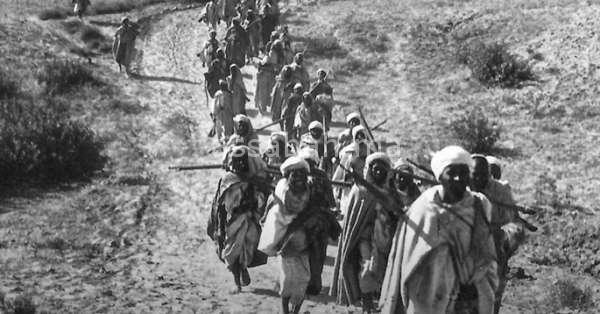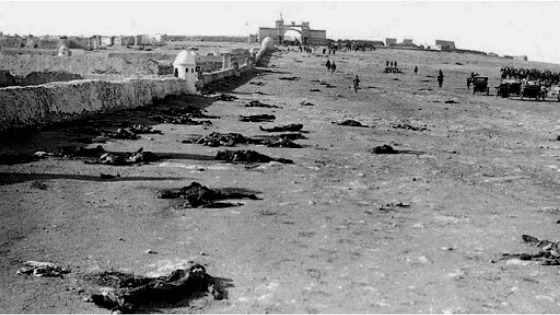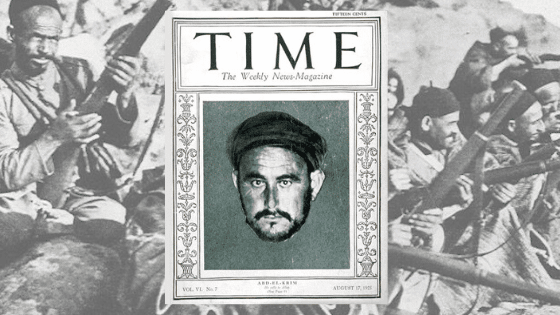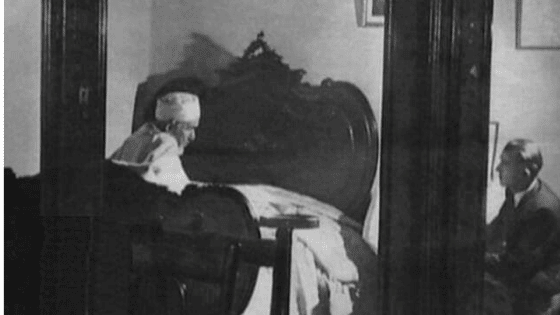Today, 58 years ago, on the sixth of February, Abdelkrim El khattabi, the Lion of the Rif left this earthly realm. His name arouses a special kind of emotion among the Amazigh of the Rif as well as Amazigh of North Africa. His achievements have stunned friends and foes, and taking into considerations the limited means available, the greatness of his design and the impeccability of his reputation, we are left with the question: was there anyone greater than him in North Africa in the last 200 years?
Starting with some 124 rifles, which were considered for his time outdated, he initiated a military campaign against the Spanish army that ended with the liberation of the Rif-region. But more than the liberation of a part of the homeland, the victory over a European colonial power in the first part of the 20th century provided a framework of hope for other colonized people all over the world. If Japans victory over Russia in 1905 was the first victory of a non-white power over a white power in the modern world, then Abdelkrim’s victory over Spain was the first major victory of an indigenous people over a European colonizer.
Abdelkrim El khattabi was born in 1882 in Ajdir, a small village in the north of Morocco. A promising student in the oldest university of the world, Qarawin in Fes, he managed to get a job as a journalist for the Spanish newspaper Telegrama del Rif before being appointed by the Spanish as the chief judge of Melilla in 1914. In 1917 he was imprisoned for more than a year because of his alleged anti-colonial activities. It is true that he was influenced by the anti-colonial and anti-imperialist ideas spread by Jamal al-Din al-Afghani, Muhammad ‘Abduh and Rashed Reda. But it was not until 1920 that Abdelkrims name would be engraved in the history of the Maghreb. It was then that he started a guerrilla war against the Spanish, whose encroachments in uncolonized parts of the Rif greatly disturbed him.

He issued a warning to General Silvestre, the commanding officer of the Spanish, and warned him that if he crossed the Ameqran River, Abdelkrim would consider this a declaration of war. General Silvestre is said to have laughed, and comically responded with for the Berbers of the Rif famous saying: ‘tomorrow I will drink tea in Abdelkrims house’. The self-confidence of the general stood in high contrast with the reality that would soon ensue on the battle field. A skirmish at Dhar Oubaran on the first of June 1921 ended in a victory for Iriffien Amazigh, and roughly 600 Spanish soldiers were killed, and the others forced to flee.
It was the prelude to the greater battle of Annoual, which took place 20 days after the skirmish at Dhar Oubaran. Abdelkrim who had managed to unify most of the tribes in a usually divided Rif was still outnumbered, and despite their inferior equipment they attacked the Spanish at Annoual and routed their army, driving the Spanish star General Silvestre as far to commit suicide. That 21 of June, 3000 Berbers defeated a modern European army killing 15.000 and imprisoning 700. A military miracle indeed.
Annoual was and remains a symbol. It was more than a military defeat for the Spanish, or a victory for the Berbers. In a world filled with racist ideologies, the Spanish were not only defeated by an adversary that was inferiorly equipped, but more importantly by one who was racially inferior. It was the victory of a colored people over a white nation, the revenge of the East on the West. This humiliation shook the political world and it caused a coup d’etat in 1923 in Spain by General Miguel Primo de Rivera’s, who instated a military dictatorship which eventually led to the collapse of a centuries old monarchy in 1931.

The Rif in Morocco was independent, and Abdelkrim founded the Rif Republic and proclaimed that his goal was the liberation of all the Maghreb. He started liberating areas from the French in a series of successful attacks. Alas, in the modern world a lot of ills can be attributed to the unnamed Plot, that had as a goal to destroy any progressive liberation project in the Third World. The French, who were occupying the other part of Morocco saw in Abdelkrims Rif Republic a dangerous precedent and sent a huge army numbering an astounding 250.000 soldiers, led by the celebrated Marshal Pétain, who showed his merits in WWI.
Resulting to the colonial practice of wreaking havoc by using mustard gas and other chemical weapons against the local population which resulted in the horrible death of thousands of inhabitants of the Rif the combined French-Spanish forces managed to quell the ambition of a people for self-determination. The couple of thousands of guerrilla warriors were no match for the enormous assembled army and Abdelkrim, seeing the futility of engaging in warfare, immediately surrendered. The French exiled him to the island of Réunion where he lingered until 1947, when he gained asylum in Egypt. He immediately set up a Committee for the Liberation of the big Maghreb.

When Morocco gained its independence in 1956 the Moroccan sultan Muhammad V, who proclaimed himself king, invited Abdelkrim El khattabi back to his homeland. He refused, because according to him Morocco was still under occupation. The colonization only changed faces. He would support the uprisings in 1957 against the absolute monarchy. In 1962 he would oppose the new constitution that was pushed trough by the new Moroccan king Hassan II, who assumed dictatorial powers. In the same year, Algeria gained its independence after a bloody struggle that lasted 8 years with million of Algerians killed. It was a happy moment for Abdelkrim.

On this day, a year later, Abdelkrim died. He left behind an impressive legacy and proved the colonized world a model for steadfastness and liberation. Both Ho Chi Min, the leader of Vietcong and Mao referred to him as our predecessor. The Committee of Union and Progress in Turkey which was led by Atatürk held Abdelkrim in high esteem. The Shi’ite scholars of Najaf issued a fatwa supporting Abdelkrims struggle. Many more would honor him in the years to come.
Nowadays, Abdelkrim is the symbol for the Amazigh movement, some of which falsely see him as the father of a Berber nation. Abdelkrim was more than just an amazigh, he was a universal warrior against injustice and colonial subjugation, and no matter how hard the Moroccan system tries to erase him out of history, he will always remain vivid.

